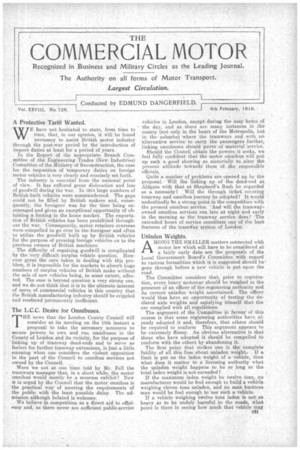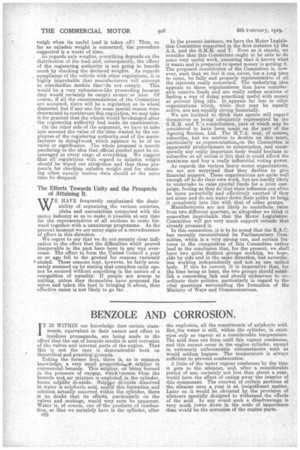A Protective Tariff Wanted. .
Page 1

Page 2

If you've noticed an error in this article please click here to report it so we can fix it.
WE have not hesitated to state, from time to time, that, in our opinion, it will be found necessary to 'assist British motor industry through the post-war period by the introduction of import duties at least for a period of years.
In the Report of the appropriate Branch Corn. mittee of the Engineering Trades (New Industries) .Committee of the Ministry of Reconstruction, the case for the imposition of temporary duties on foreign motor vehicles is very clearly and concisely set forth.
The industry is essential from the national point of view. It has suffered great dislocation and loss of goodwill during the war. In 1914 large numbers of British-built vehicles were commandeered. The gaps could not be filled by British makers and, consequently, the foreigner was for the time being encouraged and given an exceptional opportunity of obtaining a footing in the home market. The exportation of British vehicles has been prohibited throughout the war. Consequently, motor retailers overseas were compelled to go over to the foreigner and often to utilize the goodwill built up by British vehicles for the purpose of pressing foreign vehicles on to the previous owners of British machines.
The difficulty of regaining goodwill is complicated by the very difficult surplus vehicle question. However great the care taken in dealing with this problem, it is impossible for the markets to absorb huge numbers of surplus vehicles of British make without the sale of new vehicles being, to some extent, affected. The ease is beyond question a very strong one, and we do not think that it is to the ultimate interest of users of commercial vehicles in this country that the British manufacturing industry should be crippled and rendered permanently inefficient.
The L.C.C. Desire for Omnibuses.
THE news that the London County Council will consider at its meeting on the 18th instant a proposal to take the necessary measures to secure powers to own and run omnibuses in the County of London and its vicinity, for the purpose of linking up of tramway dead-ends and to serve as feelers for further tramway extensions, is just a little amusing when one considers the violent opposition in the past of the Council to omnibus services not owned by the Couneil. .
Were we not at one time told by Mr. Fell the tramways manager that, in a short while,. the motor omnibus would merely be a museum exhibit? Now it is urged by the Council that the motor omnibus is the practical way of meeting the requirements of the public with the least possible delay. The admission although belated is welcome.
We believe in competition as a direct aid to efficiency and, as there never are sufficient public-service vehicles in London, except during the easy hours of the day, and as there are many instances in the county (not only in the heart of the Metropolis, but in the suburbs) where the tramways end with no -alternative service to carry the passengers further, linking omnibuses should prove of material service. Should the Council obtain the powers it seeks, we feel fully confident that the motor omnibus will put up such a good showing as materially to alter the present. attitude towards them of the responsible officials.
Quite a number of problems are opened up by the proposal. Will the linking up of the dead-end at Aldgate with that at Shepherd's Bush be regarded as a necessity? Will the through ticket covering tramway and omnibus journey be adopted? It would undoubtedly be a strong point in the competition with the present omnibus service. And will the tramwayowned omnibus services run late at night and early in the morning as the tramway service does? The extended hours of service constitute one of the best features of the tramway system of London.
Unladen Weights.
AMONG THE SMALLER matters connected with motor law which will have to be considered at a fairly early date are the proposals of the Local Government Board's Committee with regard to various formalities which it is suggested should be gone through before a new vehicle is put upon the road.
The Committee considers that, prior to registration, every heavy motorcar should be weighed in the presence of an officer of the registering authority and its correct unladen weight ascertained. The officer would thus have an opportunity of testing the declared axle weights and satisfying himself that the car complied with all regulations. The argument of the Committee in favour of this course is that some registering authorities have already adopted it and, therefore, that others should be required to conform This argument appears to be extremely flimsy. An obvious alternative is that those who have adopted it should be compelled to conform with the others by abandoning it.
The first point that strikes one is the complete futility, of all this fuss about unladen weight.. If a limit is put on the laden weight of a vehicle, then what does it matter to a licensing authority what the unladen weight happens to be so long as the total laden weight is not exceeded 'I If the maximum laden weight be twelve tons, no manufacturer would be fool enough to build a vehicle weighing eleven tons unladen, and no sane business man would be fool enough to use such a vehicle.
If a vehicle weighing twelve tons laden is not so heavy as to be unduly harmful to the roads, what point is there in seeing how much that vehicle may, 021 -weigh when its useful load is taken off ? Thus, so far as unladen weight is concerned, the procedure suggested is a waste of time.
As regards axle weights everything depends on the distribution of the load and, consequently, the officer of the registering authority is not going to benefit much by checking the declared weights. As regards , compliance of the vehicle with other regulations, it is highly improbable that manufacturers will attempt to standardize models thatI'do not comply. This would be a very unbusiness-like proceeding because they would certainly be caught sooner' or later. Of course, if all the recommendations of the Committee are accepted, there will be a regulation as to wheel diameter, but if any one for some special reason were determined to contravene this regulation we may take it for granted that the wheels would beiChanged after the registering authority had made its examination. • On the other side of the argument, we have to take into account the value of the:time wasted by the employees of the registering autlaority,and of the manufacturer in doinework which appears to be of no value or significance. The whole proposal is merely pandering to the idea that official control must be encouraged at every stage of everything We suggest :that all' regulations with regard to unladen weight should be wiped out altogether and that these proposals for checking unladen weight and for obtaining other equally useless data should at the same time be dropped.
The Efforts Towards Unity and the Prospects of Attaining It.
WE HAVE frequently emphasized the desirability of organizing...the various societies, clubs and associations connected with the motor industry so as to make it passible at any time for the representatives of all sections to • come forward together with a unanimous programme. At the present moment we see many signs ef a recrudescence of effort in this direction.
We regret to say that we do not seelany clear indication to the effect that the difficulties whiol proved insuperable in the past have been in any way overcome. The effort to form the 'United Council a year or so ago fell to the ground for reasons variously 'stated. These reasons may, however, be fairly accurately summed up by stating that complete unity cannot be secured without something in the nature of a recognition of equality. If people are averse to uniting, unless they themselves have proposed the ninon and taken the lead in bringing it about, then effective union. is not likely to go far. .
In the present instance, we have the Motor Legislation. Committee supported in the first instance by the A.A. and the S.M.M. and T. Even as it stands, we consider that this Committee ought to be able to do some very useful work, assuming that it knows what it wants and is prepared to spend money in getting it. The proposed constitution of the Committee is, however, such that we feel it can never, for a long time to come, be fully and properly representative of all the interests really concerned. The underlying idea appeals to those organizations that have considerable reserve funds and are really rather anxious of finding a way of doing something useful with money at present lying idle. It appeals far less to other organizations which, while they may be equally active, are not equally strong financially. We are inclined to think that agents will regard themselves as being adequately represented by the S.M.M. and T.'s contribution, part of which may be considered to have been made on the part of the Agents; Section, Ltd. The M.T.A. may, of course, subscribe, but we confess to doubts on this score, particularly as ,representationeon the Committee is apparently proportionate to subscription, and consequently any really important body would hesitate to subscribe at all unless it felt that it could afford the maximum and buy a really influential voting power.
As regards the various heavy motor organizations, we are not -surprised that they decline to give financial support. These organizations are quite well enough off to do their own work, but are hardly likely to undertake to raise special funds for a joint campaign, feeling as they do that their influence can often be more powerfully and effectively exerted if they act alone and do not water down their policy to bring it completely into line with that of other groups.
Manufacturers are not likely to contribute twice from two different quarters, so altogether we think it somewhat improbable that the Motor Legislation Committee will get very much support outside that already promised it.
In this connection, it is to be noted that the R.A.C. has recently reconstituted its Parliamentary Committee, which is a. very strong one, and certain features in the composition of this Committee rather lead to the conclusion that, for the present, we shall have two quite distinct groups working, we hope, side by side and in the same direction, but nevertheless working independently and not a-s one united body. If this be correct, it is imperative that, for the tune being at least, the two groups should establish a connecting link and should endeavour to coordinate their policies, particularly in regard to the vital questions surrounding the formation of the Ministry of Ways and Communications.






















